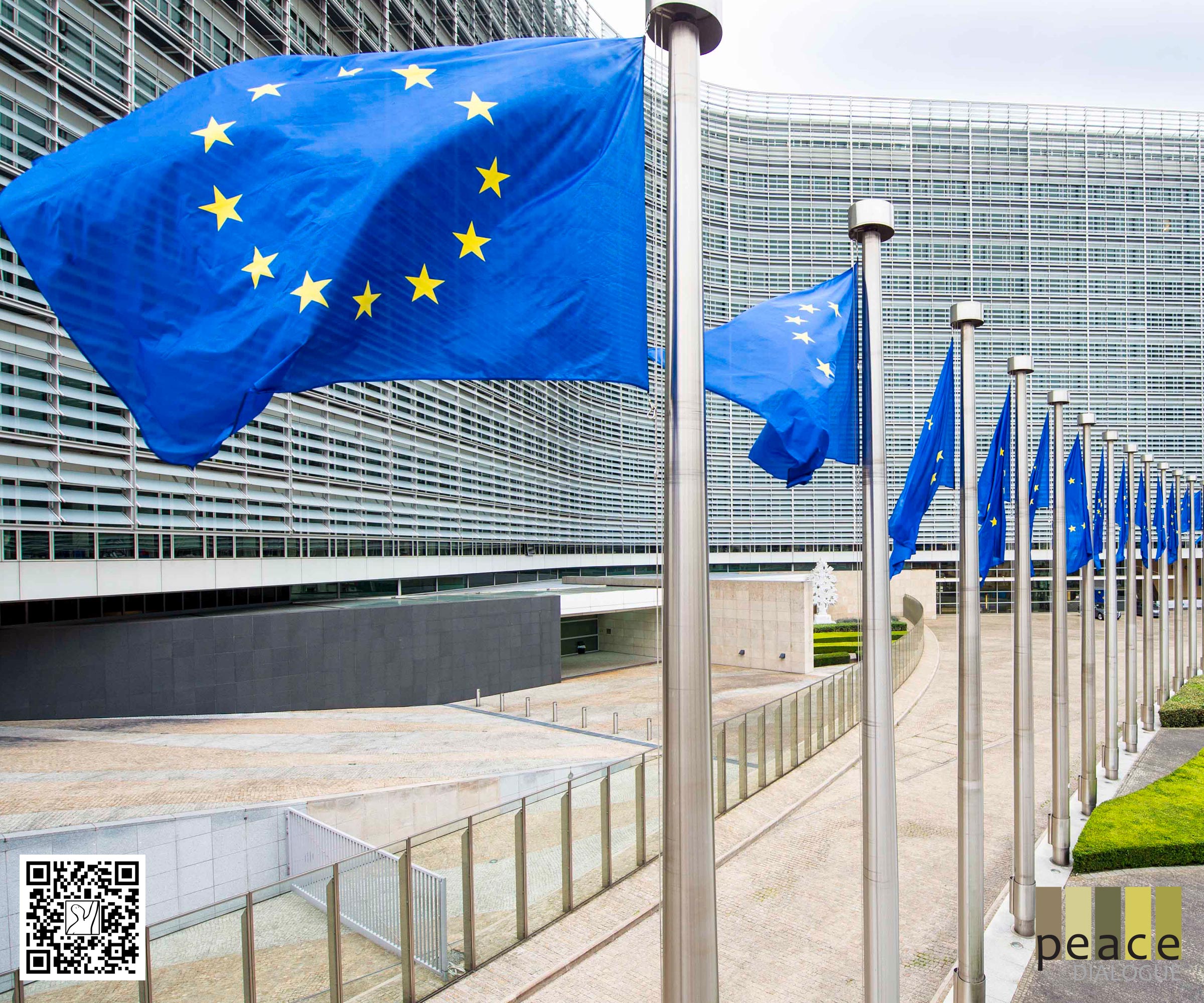
Photo by Etienne Ansotte / European Commission
 EDGAR KHACHATRYAN
EDGAR KHACHATRYAN
President of Peace Dialogue NGO
The original Armenian version of this article was published by website Analyticon.
The second Armenian-Azerbaijani large-scale military confrontation – the 44-day war of 2020, as well as the events preceding it and continuing to this day – not only irreversibly transformed the geopolitical picture of the South Caucasus, but also created favorable conditions and became an incentive for the rearrangement of extra-regional power centers and sometimes unpredictable developments. The ‘expected unexpected’ war in one way or another affected all the countries of the region, forcing internal and external actors to re-orient themselves and show maximum efficiency and flexibility in the newly emerging environment.
The signing of a trilateral statement “On a ceasefire in the zone of the Nagorno-Karabakh conflict and the cessation of all hostilities” on November 10, 2020, with the mediation of Russian President Vladimir Putin, which permitted Russia to deploy its peacekeeping units “Along the perimeter of the contact line in Nagorno-Karabakh and the Lachin corridor”, and indeed allowed Russia, one of the OSCE Minsk Group co-Chairs, to position itself as the most influential actor in the conflict settlement process. Official Moscow, both at the level of statements and actions, has consistently emphasized its dominant role in the post-Soviet area, in particular, in the context of the peaceful settlement of the Nagorno-Karabakh conflict. This “special” status of Moscow has been “recognized” for many years both by the parties to the conflict and by the other co-Chairs of the OSCE Minsk Group – the United States and France. As a result, in parallel with its activities within the Minsk Group, Moscow continuously pursued its own geopolitical course, which often did not comply with the approaches of the Minsk Group.
In Western expert circles, it is highly emphasized that Moscow’s ambiguous policy – either as Minsk Group co-Chair or as a separate actor with “special status” – undermined confidence in the region in the actions of the Minsk Group overall. Unlike the Russian Federation, the United States and France carried out actions aimed at a peaceful settlement of the Nagorno-Karabakh conflict mainly within the framework of the Minsk Group. Even when in some cases these two countries came forward with their own initiatives, they did not deviate from the framework of the official Minsk Process.
Currently, more than a year after the 44-day war, one can assuredly state that during the hostilities in 2020, the Minsk Group was completely paralyzed, and the statements and calls periodically voiced by the heads of the co-Chair countries and the most authoritative international and regional organizations were not able to stop the bloody war. A vulnerable truce that can break down at any moment was managed only by the official mediation of Moscow after 44 days (and after a previous Russian-brokered ceasefire had failed) and the direct participation of Russian President Vladimir Putin.
The European Union has not been directly involved in the conflict settlement process. It is generally seen that France represents the European Union in the Minsk Group. Back in 1994, after signing the ceasefire agreement for the first Karabakh war, the EU’s official position was that it unconditionally supports the Minsk process. Does the EU intend to reconsider its actions or approaches related to the South Caucasus after the establishment of a new status quo following the 44-day armed confrontation? For a comprehensive answer to this question, a whole range of factors should be considered – the capacities opportunities of this structure, including the existing mechanisms for making political decisions and crisis response, relations with the countries of the region, as well as the actors involved in it, and a myriad of other circumstances.
European officials themselves often compare the EU to a gigantic ocean tanker which albeit powerful, is not noted for agile or flexible navigation. According to many people, the main problem in the EU’s decision-making process is the heterogeneity of its structure: decisions must be agreed by the 27 member countries, pursuing different goals, interests and benefits, although they share a common democratic value system and united opportunities for mutually beneficial economic cooperation. Despite the complexity of the decision-making mechanism, the European Union, nevertheless, manages at times to quite quickly and effectively respond to, for example, the events unfolding around Ukraine, unlawful actions and violence used against the opposition by the leadership of Russia or Belarus, and developments in Moldova. The reason for this promptness of such a complex structure is that there is a consensus among all 27 countries regarding the parties involved in these crisis situations, their role and power. Elaborating – and reconciling – the positions of all the member states did not consequently require a long period of time.
Nevertheless, the situation is different with respect to the conflict parties involved in the Karabakh conflict. In other words, we can assume that in the European Union there is no consensus in favor of one of the parties, therefore, there are no common assessments about the actions of the parties or their consequences. As a result, during the 44-day hostilities in the Nagorno-Karabakh, Brussels voiced mainly statements that put an equality sign between the parties and the assessment of their actions – or to use the popular phrasing, was ‘both-sidist’. There were general, unaddressed calls for restraint, but they were not followed by concrete actions to make parties desist from outrageous human rights violations. Simultaneously, it is worth mentioning that earlier the authorities of both Armenia and Azerbaijan did not respond to the EU’s appeals, resolutions and statements condemning the Russian and Belarusian authorities in connection with the recent events around Ukraine or violations of the rights of opposition figures by the authorities of these countries.
More than a year after the hostilities, the European Union declares that it is ready to make every effort to establish sustainable peace in the region. The proposal of the head of the European Council Charles Michel to organize a meeting of the heads of Armenia and Azerbaijan in the scope of the Eastern Partnership summit in Brussels was one of the steps aimed at establishing sustainable peace in the region. It is noteworthy that the Kremlin’s reaction to the invitation of the head of the European Council was instant: immediately after the statements of the heads of Armenia and Azerbaijan about their consent to take part in the Brussels meeting, an invitation was made to meet first in Russia. Thus, before leaving for the EU capital in mid-December, Pashinyan and Aliyev received an invitation to meet in Sochi, Russia, on 26 November. It would be hardly possible to ignore or interpret differently the Kremlin’s blaring message, directed both to the parties and to the international community. However, on the background of “frozen” conflicts of different intensities in the post-Soviet space, in which Russia and the European Union traditionally act as opponents, in the case of the Nagorno-Karabakh conflict, the European Union has to date “put up with” the influence of Russia in the settlement of the conflict and regional developments.
By the results of the meeting between Prime Minister Pashinyan and President Aliyev, held on December 14 in Brussels through the mediation of European Council President Charles Michel, it becomes clear that the Brussels meeting was intended as a logical continuation of the Sochi meeting on November 26, which was mediated by the Russian President Putin. In the text of the statement published after the meeting by the office of Charles Michel, in particular, it is noted that the parties will be committed to the agreements reached on November 26 in Sochi.
However, it is noteworthy that within the framework of the Brussels meeting, quite interesting proposals were put forward by the European Union, which, according to the published statement, were accepted by Pashinyan and Aliyev. In particular, during the meeting in Sochi, the parties came to an agreement on the establishment of a commission on delimitation / and later – demarcation of the Armenian-Azerbaijani state border with the consultative participation of Russia. At the Brussels meeting, the parties agreed that the EU will provide an advisory mission of experts to assist in the delimitation and demarcation of borders and provide both parties with technical support. In addition, the European Union intends to begin the restoration of railways with appropriate border and customs equipment on the principle of reciprocity, which is principally based on the discussions on the economic and transport unblocking, which were outlined in Sochi.
Within the framework of the same Eastern Partnership summit, on the same day of the summit, another meeting between Pashinyan and Aliyev took place – this time with the mediation of the French president Emmanuel Macron. The details of the talks have not been made public, but curiously, on the eve of the meeting, Macron held a telephone conversation with Russian President Putin, during which the latter informed the French president about the main results of the meeting of the leaders of Russia, Armenia and Azerbaijan on November 26 in Sochi. As reported in the press, the presidents of France and the Russian Federation spoke about the maintenance of the ceasefire regime, the return of refugees, issues related to the restoration of trade, economic and transport connection, and confirmed their determination to promote the activities of the OSCE Minsk Group.
In the final statement of the summit itself, in particular, it was stated that the summit participants welcome the EU’s efforts, enhanced engagement and strengthened role in conflict prevention, conflict resolution, confidence building in the framework or in support of existing, agreed negotiating formats and processes, including through field presence when appropriate. The statement, in fact, expands the range of the European Union’s involvement in the region and its spheres of engagement. From the text of the declaration, it becomes obvious that the European Union intends to enhance its efforts to promote the peaceful settlement of unresolved conflicts in the territory of the Eastern Partnership in order to neutralize the ongoing attempts at destabilization which pose a threat to peace, security and stability, as well as violations of the principles of international law.
Coming back to the role and influence of the European Union, especially in the zone of the Nagorno-Karabakh conflict, it is necessary to take into account the fact that in almost all conflicts on the territory of the Eastern Partnership, the EU traditionally holds a position opposed to Russia, which has the status of a “special mediator” in the Nagorno-Karabakh conflict. The examples given substantiate the fact that the European Union, nevertheless, is ready to assume the role of a counterbalance to Russia’s unconditional political influence in the Nagorno Karabakh conflict zone. Providing such a counterbalance is certainly necessary in the region, especially from the perspective of preventing the devaluation of democracy and the threat of new security and humanitarian crises. On the other hand, based on the examples of the already implemented actions of the EU, in case of such geopolitical developments, one should expect that instead of a new confrontation with the Russian Federation, the EU would prefer a policy of complementarity and what might be called ‘supplementarity’. In other words, instead of being involved in political processes to resolve the conflict, the EU, as a priority, will choose the role of a mediator in ensuring regional stability and security, as well as implementing economic projects, leaving the political settlement to the OSCE Minsk Group with its legitimate mandate. We can only hope that the heads of the co-Chair countries will be able to show sufficient political will to revive the Minsk Group – in cooperation with the parties involved in the conflict, and resume its activities.
P.S. This article had already been sent to press, when it became known that, according to the agreements reached during the meeting of the heads of Armenia and Azerbaijan on the initiative of the President of the European Council Charles Michel, through the mediation of EU Special Representative Toivo Klaar, on December 19, 10 Armenian prisoners of war were released and returned from Baku to Yerevan.



